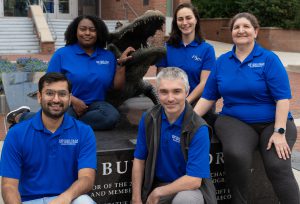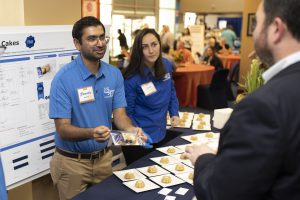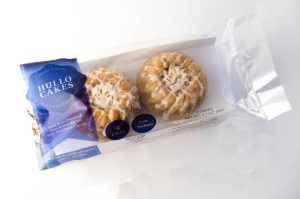The idea was prompted by a bakeoff. Use the discards from one kind of food and reuse them to make a snack cake just a little healthier.
It’s the kind of research project Dr. Andrew MacIntosh—Dr. Mac to students and colleagues—leads in a lab stocked with commercial grade ovens, extruders, pasteurizers, fermenting tanks and freezers. As a food scientist, he’s deeply involved in the transformation of crops into the products you find on grocery store shelves.
Food science brings together biology, sociology, chemistry, engineering and economics. It’s a wraparound approach to figuring out what you’ll eat and getting it to your plate. The University of Florida’s Institute of Food and Agricultural Sciences (UF/IFAS) can do this so well because it has so many kinds of expertise in feeding people. After all, as we like to say, food is our middle name.
One of the jobs of the UF/IFAS Food Science and Human Nutrition Department (FSHN) is to create Florida-made foods. Dr. Mac’s team of graduate students invented a Florida entry for the American Baking Society’s annual Product Development Competition to create a baked good with health benefits.
It’s the premier industry forum for students to showcase the products they create, not to mention compete for scholarships and network with future employers.

Team Mac took a Florida-centric approach to the challenge. MacIntosh started with pulp and peels left over from making orange juice. That could divert waste from landfills and reduce growers’ disposal bills. It could even mean growers profiting from the sale of material they would have thrown out.
The treasure Team Mac saw in this trash was its fiber. Americans don’t get enough of it in their diet. Studies indicate fiber can have health benefits. It doesn’t turn dessert into health food, but it can introduce a nutritional benefit into a snack.
The Hullo Cake made its Gainesville debut at the recent Flavors of Florida at Ben Hill Griffin Stadium, an annual celebration of food and drink made with UF/IFAS-created crops and expertise.

Team Mac Ph. D. student Devanshu Mehta had bragging rights, as the UF/IFAS team had won the national competition. And he had the pièce de résistance: a golden bet-you-can’t-eat-just-one vanilla- and rum-flavored sponge cake with fluffy horchata-flavored cream filling. Frankly, I didn’t care much after the first bite whether it was high fiber!
For consumers like me and you, this is where food science gets fun—tasting new foods. But for food scientists, it’s where the best-conceived project can sputter at the finish line when we decide a snack cake is too sweet, too crumbly, too chalky, or too something-we-can’t-describe. Or too expensive, or too hard to find.
The experience creating and pitching the Hullo Cake is, at the very least, an exercise in developing food professionals, addressing a labor shortage in industry. The national food, agriculture and natural resources sector needs to fill nearly 60,000 jobs a year. America’s colleges and universities graduate about 36,000 majors from directly relevant degree programs. Mehta will be going to work for Impossible Foods after he finishes his dissertation this summer.
Because of the public support we at UF/IFAS get, we can take many shots on goal in search of the next great blueberry, poinsettia, cut of meat or snack cake. Students and scientists spend their days looking for ways to improve the food you eat. At the same time, they have Florida farmers in mind, keeping them competitive in a global market lowering their production costs, creating new uses for what they produce and shrinking their environmental footprint.
As a product of public science, the Hullo Cake started from scratch, with the what-if questions of inquiry. With the ingredients of innovation—labs, computers, grant funding, business partnerships, students and researchers—public science pursues fully baked answers.
 4
4
